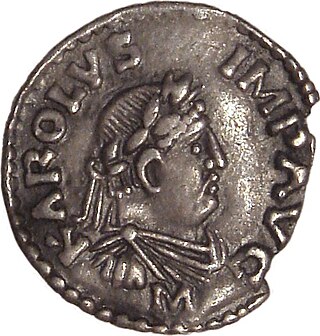
Charlemagne was King of the Franks from 768, King of the Lombards from 774, and Emperor of what is now known as the Carolingian Empire from 800, holding these titles until his death in 814. He united most of Western and Central Europe, and was the first recognised emperor to rule from the west after the fall of the Western Roman Empire approximately three centuries earlier. Charlemagne's reign was marked by political and social changes that had lasting influence on Europe throughout the Middle Ages.

Charles Martel, Martel being a sobriquet in Old French for "The Hammer", was a Frankish political and military leader who, as Duke and Prince of the Franks and Mayor of the Palace, was the de facto ruler of the Franks from 718 until his death. He was a son of the Frankish statesman Pepin of Herstal and a noblewoman named Alpaida. Charles successfully asserted his claims to power as successor to his father as the power behind the throne in Frankish politics. Continuing and building on his father's work, he restored centralized government in Francia and began the series of military campaigns that re-established the Franks as the undisputed masters of all Gaul. According to a near-contemporary source, the Liber Historiae Francorum, Charles was "a warrior who was uncommonly ... effective in battle".

Louis the Pious, also called the Fair and the Debonaire, was King of the Franks and co-emperor with his father, Charlemagne, from 813. He was also King of Aquitaine from 781. As the only surviving son of Charlemagne and Hildegard, he became the sole ruler of the Franks after his father's death in 814, a position that he held until his death except from November 833 to March 834, when he was deposed.

Aquitaine, archaic Guyenne or Guienne, is a historical region of Southwestern France and a former administrative region. Since 1 January 2016 it has been part of the administrative region of Nouvelle-Aquitaine. It is situated in the southwest corner of metropolitan France, along the Atlantic Ocean and the Pyrenees mountain range on the border with Spain; for most of its written history Bordeaux has been a vital port and administrative centre. It is composed of the five departments of Dordogne, Lot-et-Garonne, Pyrénées-Atlantiques, Landes and Gironde. Gallia Aquitania was established by the Romans in ancient times and in the Middle Ages, Aquitaine was a kingdom and a duchy, whose boundaries fluctuated considerably.

Pepin II, commonly known as Pepin of Herstal, was a Frankish statesman and military leader who de facto ruled Francia as the Mayor of the Palace from 680 until his death. He took the title Duke and Prince of the Franks upon his conquest of all the Frankish realms.

Carloman was the eldest son of Charles Martel, mayor of the palace and duke of the Franks, and his wife Chrotrud of Treves. On Charles's death (741), Carloman and his brother Pepin the Short succeeded to their father's legal positions, Carloman in Austrasia, and Pepin in Neustria. He was a member of the family later called the Carolingians and it can be argued that he was instrumental in consolidating their power at the expense of the ruling Merovingian kings of the Franks. He withdrew from public life in 747 to take up the monastic habit, "the first of a new type of saintly king", according to Norman Cantor, "more interested in religious devotion than royal power, who frequently appeared in the following three centuries and who was an indication of the growing impact of Christian piety on Germanic society".

The Carolingian dynasty was a Frankish noble family named after Charles Martel and his grandson Charlemagne, descendants of the Arnulfing and Pippinid clans of the 7th century AD. The dynasty consolidated its power in the 8th century, eventually making the offices of mayor of the palace and dux et princeps Francorum hereditary, and becoming the de facto rulers of the Franks as the real powers behind the Merovingian throne. In 751 the Merovingian dynasty which had ruled the Franks was overthrown with the consent of the Papacy and the aristocracy, and Pepin the Short, son of Martel, was crowned King of the Franks. The Carolingian dynasty reached its peak in 800 with the crowning of Charlemagne as the first Emperor of the Romans in the West in over three centuries. Nearly every monarch of France from Charlemagne's son Louis the Pious till the penultimate monarch of France Louis Philippe have been his descendants. His death in 814 began an extended period of fragmentation of the Carolingian Empire and decline that would eventually lead to the evolution of the Kingdom of France and the Holy Roman Empire.
Under the Merovingian dynasty, the mayor of the palace or majordomo. (Latin: maior palatii or maior domus) was the manager of the household of the Frankish king. He was the head of the Merovingian administrative ladder and orchestrated the operation of the entire court. He was appointed by the king from among the magnates, the most powerful families. Austrasia, Neustria and Burgundy had their own mayor of the palace. After Chlothar II, who ruled over the entire Frankish Kingdom, had ordered the execution of Warnachar, the mayor of Burgundy, the magnates of Burgundy declared in 626 not to want their own mayor anymore; see Fredegar IV.54. This declaration marks the effective end of the Burgundian court and the beginning of the Neustrian-Burgundian political alliance against Austrian influence. The Austrian magnates revolted and the Battle of Tertry of 687 became the Austrasian victory with Pepin of Herstal as their leader and the new mayor of the palace.

The Kingdom of the Franks, also known as the Frankish Kingdom, the Frankish Empire or Francia, was the largest post-Roman barbarian kingdom in Western Europe. It was ruled by the Frankish Merovingian and Carolingian dynasties during the Early Middle Ages. Francia was among the last surviving Germanic kingdoms from the Migration Period era.

Alamannia, or Alemania, was the kingdom established and inhabited by the Alemanni, a Germanic tribal confederation that had broken through the Roman limes in 213.

Pepin or Pippin, was King of Italy from 781 until his death in 810. He was the third son of Charlemagne. Upon his baptism in 781, Carloman was renamed Pepin, where he was also crowned as king of the Lombard Kingdom his father had conquered. Pepin ruled the kingdom from a young age under Charlemagne, but predeceased his father. His son Bernard was named king of Italy after him, and his descendants were the longest-surviving direct male line of the Carolingian dynasty.
Bernardof Septimania (795–844), son of William of Gellone and cousin of Charlemagne, was the Duke of Septimania and Count of Barcelona from 826 to 832 and again from 835 to his execution, and also Count of Carcassonne from 837. He was appointed to succeed the third Count of Barcelona, Rampon. During his career, Bernard was one of the closest counsellors of the Emperor Louis the Pious, a leading proponent of the war against the Moors, and was an opponent of the interests of the local Visigothic nobility in Iberia.
Charles the Younger was the son of the Frankish ruler Charlemagne and his wife Queen Hildegard. Charlemagne's second son, Charles gained favour over his older, possibly illegitimate half brother Pepin. Charles was entrusted with lands and important military commands by his father. In 800, Charlemagne was crowned emperor by Pope Leo III, and during this ceremony Charles was anointed a king. Charles was designated as the heir of the bulk of Charlemagne's lands but predeceased his father, leaving the empire to be inherited by his younger brother Louis the Pious.

Pepin the Short, was King of the Franks from 751 until his death in 768. He was the first Carolingian to become king.

Plectrude was the consort of Pepin of Herstal, the mayor of the palace and duke of the Franks, from about 670. She was the daughter of Hugobert, seneschal of Clovis IV, and Irmina of Oeren. She was the regent of Neustria during the minority of her grandson Theudoald from 714 until 718.
The Duchy of Alsace was a large political subdivision of the Frankish Empire during the last century and a half of Merovingian rule. It corresponded to the territory of Alsace and was carved out of southern Austrasia in the last decade of the reign of Dagobert I, probably to stabilise the southern reaches of Austrasia against Alemannia and Burgundy. By the late Middle Ages, the region was considered part of Swabia.
Theudebald or Theutbald was the Duke of Alamannia from 730 until his deposition. He was a son of Gotfrid and brother and co-ruler with Lantfrid from 709.
The Etichonids were an important noble family, probably of Frankish-Burgundian origin, who ruled the Duchy of Alsace in the Early Middle Ages. The dynasty is named for Eticho, who ruled from 673 to 690.
Cotefredus was the Duke of Alamannia in the late 7th century and until his death. He was of the house of the Agilolfing, which was the dominant ruling family in the Frankish Duchy of Bavaria.